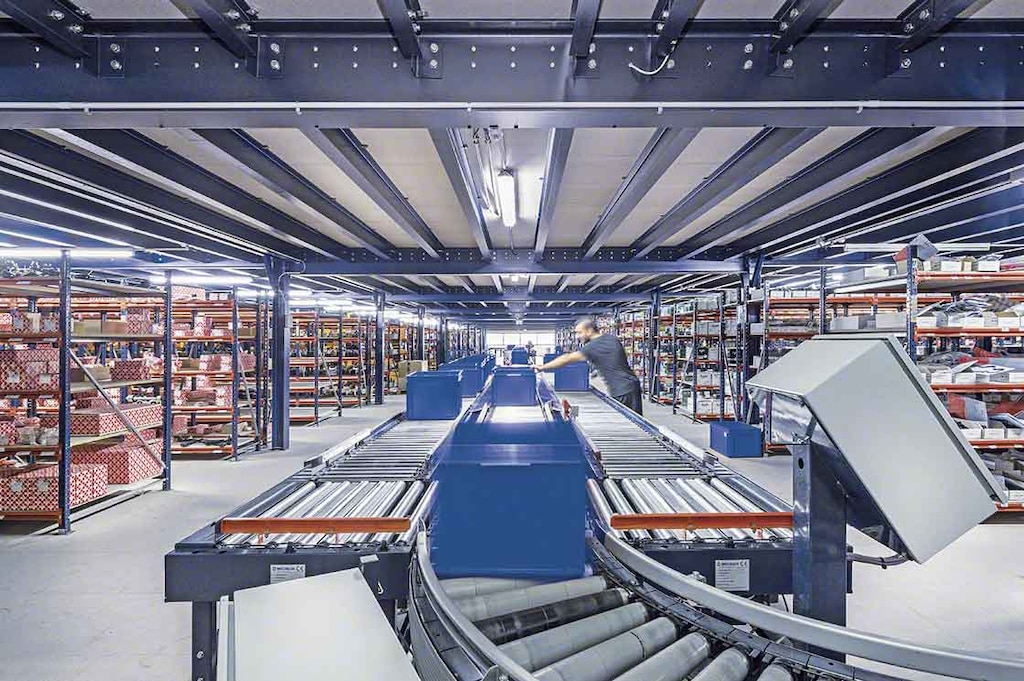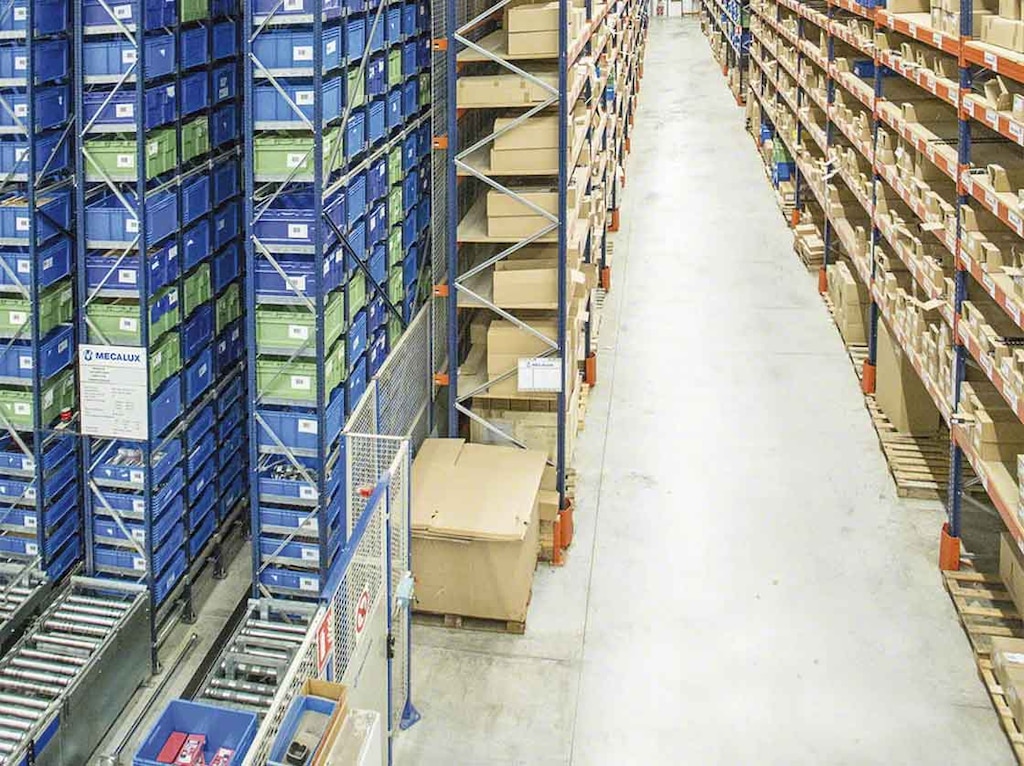
Micro-fulfilment centres hit the big cities
Retail companies have had to adapt to online sales of their products at an unprecedented rate. E-commerce has forced them to reorganise their entire supply chain, starting with harmonising their warehouses with omnichannel retail strategies. This has led to the concept of micro-fulfilment, that is, micro-logistics centres located in urban areas and charged with bringing products to end consumers.
Decentralised logistics was created with a view to having installations that were smaller but more agile and able to manage more complex orders. The main goals of micro-fulfilment centres are to bridge the distance with customers, speed up order delivery times and slash logistics costs.
In this article, we’ll analyse micro-fulfilment centres: their characteristics, their advantages for companies’ logistics operations and the importance of automation for streamlined, error-free order preparation.
What’s micro-fulfilment?
One logistics strategy being adopted by many businesses in the e-commerce sector nowadays is micro-fulfilment. But what is it, exactly? The objective of micro-fulfilment is to supply products to final consumers, thereby expediting deliveries of online orders.
Typically, micro-fulfilment centres are small, located near cities and equipped with automated storage systems. They’re urban microhubs set up to prepare a large number of orders, each with few SKUs, which are common in online sales.
How did the concept of micro-fulfilment arise? The e-commerce boom has transformed consumption habits. In addition to more complex orders, users demand increasingly faster deliveries.
Customers will no longer settle for receiving the product two or three days after purchasing it; they want it the next or even the same day. It’s getting more and more difficult to achieve customer satisfaction and loyalty and logistics now plays a crucial role in this.

Micro-fulfilment centres
The first distinctive characteristic of micro-fulfilment centres is their location, which is a concept strictly linked to logistics real estate. To shorten delivery times, it’s advisable to move the warehouse closer to the end consumers, who, from a volume point of view, live in big cities. The installation doesn’t exactly have to be downtown, but it should be near the major city to ensure that the last mile, one of the most critical points in e-commerce logistics, is as efficient as possible.
A simple way to set up a microhub in a city is to convert spaces within commercial premises (for example, the warehouse of a hypermarket). Without forfeiting the inventory of the shop itself, you optimise a space you already have and can now prepare orders much closer to the customers.
A second characteristic of micro-fulfilment centres is the presence of automation in both storage tasks and order management. The commitment to implementing technology in warehouses makes it possible to streamline operations, improve inventory management, reduce errors and eliminate logistics cost overruns.
Some common automation solutions in micro-fulfilment centres are miniload systems or AS/RS for boxes, mezzanines combined with conveyors and dark warehouses (fully automated installations that don’t require lighting). Likewise, a robust warehouse management system (WMS) is essential for achieving high throughput.
Micro-fulfilment pros and cons
Having a micro-fulfilment logistics centre lets you deliver orders more quickly and implement omnichannel strategies more effectively. Some of its major advantages include:
- Speedy order deliveries: the distance between the warehouse and the end consumer is directly proportional to order delivery times. A micro-fulfilment centre notably cuts last-mile times.
- Optimised omnichannel strategies: decentralised logistics makes it possible to prepare more complex orders, such as those in omnichannel retail, where a product can be delivered or returned via different channels (physical shop, home, point of delivery, etc.).
- Decreases in certain logistics costs: proximity to end customers makes it easier to trim transport costs. Plus, micro-fulfilment allows you to better leverage the spaces you already have.
This new trend, however, does have some drawbacks that retail firms should bear in mind:
- Limited storage capacity: although space optimisation is a reality, urban hubs are not known to have a lot of storage surface area.
- Few units per SKU: due to the fact that e-commerce sales feature a small number of units per SKU and a wide variety of products, there are fewer opportunities to make the most of the storage space than there were with more uniform goods.
- Limited order preparation capacity: in cases where the micro-fulfilment centre is located in a shop, the complexity of combining online orders without affecting inventory in the brick-and-mortar shop makes it impossible to prepare a very large number of orders, in contrast with large distribution centres.
All-in-one solution: automated operations and management
Micro-fulfilment centres require cutting-edge technology, adjusted to the size and needs of the installation, to guarantee efficient operations, respond to e-commerce challenges and ensure logistics systems tailored to omnichannel strategies.
Along these lines, when the dimensions of the micro-fulfilment centre allow for it, one solution that stands out is the miniload warehouse for boxes, which maximises space efficiency by means of an AS/RS stacker crane. With this system, based on the product-to-person principle, goods are picked from their locations and automatically brought to the pick stations.
Simultaneously, a WMS (Easy WMS by Mecalux, for instance) monitors all processes carried out. This yields greater throughput in both storage and picking tasks. The drop in logistics costs and errors generates a quick return on investment (ROI).
Easy WMS has various modules that enhance the management of micro-fulfilment centres:
- Store fulfilment: controls the inventory of the warehouse and of the physical shop in real time. Adaptable to various types of shops, Store Fulfilment prevents stockouts and synchronises operations between the installation and the brick-and-mortar shop (order prep, replenishment, returns, etc.).
- WMS for Ecommerce: ensures the scalability of an e-commerce business, in addition to optimising and lowering the costs of omnichannel logistics. This module streamlines workflows, improves picking times and prevents errors in order preparation.
- Multi Carrier Shipping Software: incorporates advanced functionalities to manage operations related to the packaging and labelling processes as well as connections with the major transport agencies.

Retail outlets: present and future
In the current market, innovation goes hand in hand with being competitive. If a company doesn’t modernise its processes, it runs the risk of falling behind.
Micro-fulfilment is the ideal solution for retail businesses to really make a difference in dealing with the logistics challenges of omnichannel retail and the changing mindsets of end consumers.
Mecalux has an extensive catalogue of storage systems that mould to any kind of space, as complex as it may be. In addition, the features offered by Easy WMS will help you to maintain a flexible, error-free supply chain.
Be sure to contact us if you need personalised advice on designing, installing, or fine-tuning your warehouse.
